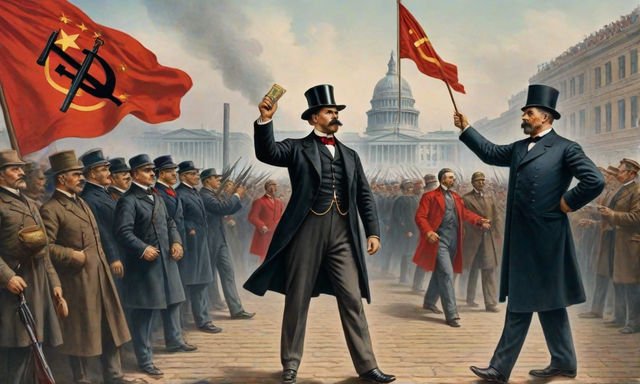Consumed by the moral distaste for the consequences of overstretched human selfish instincts inherent in the capitalistic system, Karl Marx and Friedrich Engels did not hesitate to craft the Communist Manifesto in 1848 as a better alternative to capitalism and the dangers it posed to humankind.
For Charles Dickens, the misery and dislocation of modern London between 1835 and 1870 as a result of capitalism was a struggle not just between two ideas, but between two parts of human nature itself: on the one side, man’s inherently competitive, self-acquisitive instincts, and on the other his frequent intellectual or moral distaste for the consequences of extreme human selfishness.
By 1917, the struggle against capitalism had taken on a systemic, ideological, geopolitical flavor, with the Bolshevik revolution overturning the provisional government in Russia as the world’s first communist government came into being.
From 1917 to 1991, the fiercest battle was declared between capitalism and communism. This battle for supremacy was not only to prove which system offered a superior way to organize an economy and a country, but also which has superior insight into the true nature of human instincts and motivation.
Notwithstanding capitalism’s inherent unpopularity because of its widespread weaknesses, such as a history of instability and a desire to create inequality between those who succeed and those who fail, it was able to defeat its archrival — communism.
Capitalism not only survived, but also thrived and received admiration around the world as the best hope for humanity. But that was not without undergoing drastic transformation that gave capitalism a human face throughout the 20th century.
Capitalism stood to defeat the encroachment of communism because it moved away from the raw state of the survival-of-the-fittest to becoming a social welfare system; that is, a system that looked after people when capitalism failed. It did so convincingly; not only did it offer all the social safety nets that communism was preaching, but it also did so without denying citizens their cherished freedoms.
So everyone in the West strongly stood up against communism anywhere it could be found, culminating into the collapse of the Soviet Union, and the dismantling of communism.
But with this defeat of communism and the collapse of the Soviet Union came the disappearance of all the social programs that once held under check the capitalism of Bismarck, Churchill, and Roosevelt. Gradually, the human face of capitalism is being replaced with the old and more frightening capitalistic principles of the 19th century.
Today, with the resurgence of corporate greed and corruption, capitalism once again is an exploitative system searching for where the cheapest labor and freest market can be found without any form of social and governmental obligations.
These so-called global corporations now seek safe havens in countries like China, India, and Mexico — which have all sorts of weak policies simply to lure companies — where they essentially have no responsibility or social contracts.
The accompanying danger, therefore, leads to the obvious questions: Without paying a living wage to these poor workers, how can developing countries be able to build a middle-class economy, critical to long-term economic growth and improving the domestic market? Where will the governments of these “taxless” economies find the revenues to build the infrastructure and social programs necessary to keep their countries continuously attractive?
If governments and citizens do not get their fair share from exploitative corporations, what incentives will they have to defend and protect the current capitalist globalization?
Answering these questions will lead us to agree with Professor Lester Thurow, one of the world’s leading economists. As he clearly stated in his recent book, Fortune Favors the Bold, he writes that capitalist globalization needs to undergo drastic overhauling just like capitalism did in the 20th century. That includes curtailing the growing excesses of global corporations, preventing them from becoming more powerful than nation states.
It also includes redefining the economic goals of nations, with respect to both citizens and corporations alike.
Without treating this cancer, the consequences are certain; the shrinking of the middle-class in developed economies like the United States and Europe, and the inability of people in developing economies to have enough money in their pockets will trigger a global protest and the rise of new communist movements in those countries left to bear the burden of capitalist globalization.
First published in 2001 in the Tech-MIT as Basil Enwegbara









